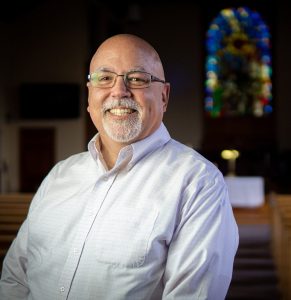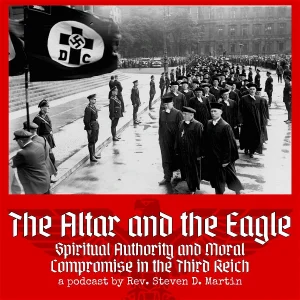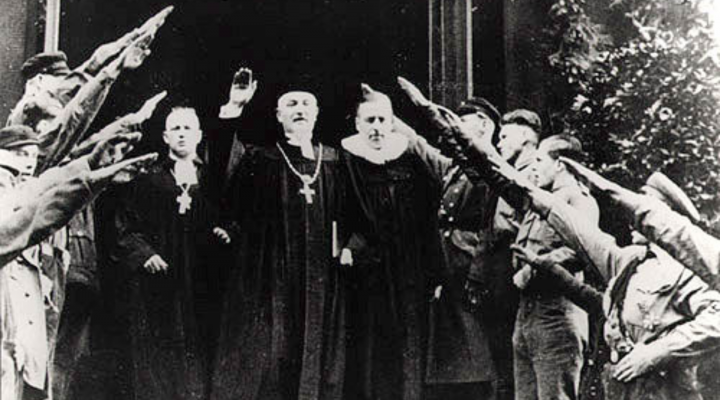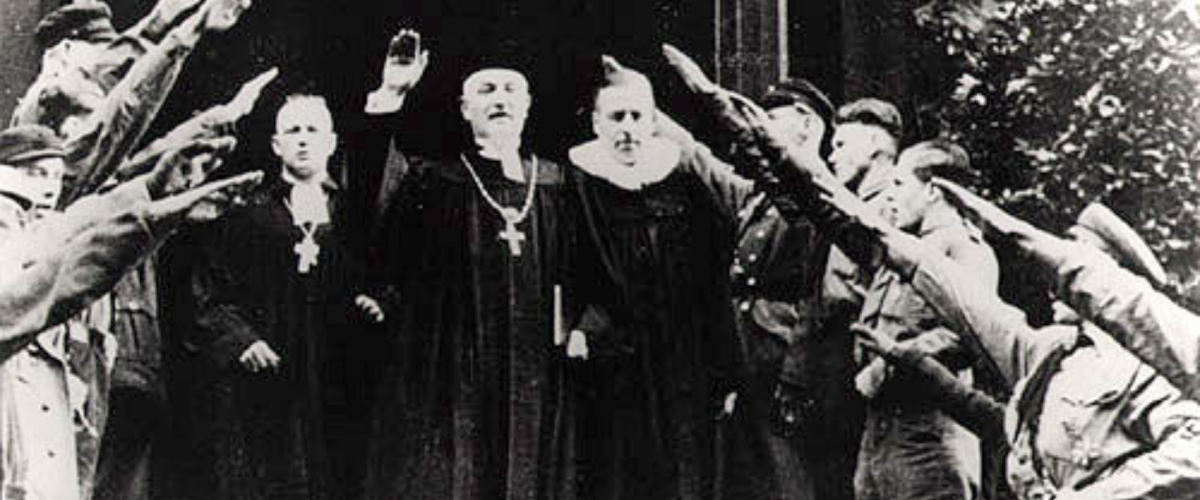When Steven D. Martin was in seminary, he read a book titled Theologians Under Hitler. The book examined how seemingly faithful, moral German Christians could have supported the tyrannical, murderous Nazi regime in the 1930s and 1940s.
Martin has been struggling ever since with the knowledge that the theologies he studied were formed by people who actively participated with the Nazi government.
Now, as the United States and other countries face the threat of increasing authoritarian governments, Martin, a United Methodist clergyman, has begun a new podcast, “The Altar and the Eagle.” The history podcast explores the phenomenon of religious people giving their support to a political system that diametrically opposes the teachings of Jesus Christ through the lens of Germany’s Third Reich. Its title refers to German churches displaying Nazi flags, something the podcaster likens to American churches displaying U.S. flags in their worship spaces.
“Why are Christian leaders often found on the wrong side of history?”
Martin writes on the podcast website of his rationale: “For the past two decades, I have grappled with a crucial question: Why are Christian leaders often found on the wrong side of history? This introspection has been a journey, one that has led me to scrutinize our past to glean insights for our present. It’s not about criticizing the church out of bitterness; it’s about understanding our missteps to avoid repeating them. The stark revelations of the church’s failures during the Third Reich have been particularly illuminating. As we embark on this exploration, we aim to unravel the complexities of those times to ensure that history does not repeat itself.”

Steven Martin
Martin said in an interview the journey to his new podcast began in 2001 and 2002 as U.S. politicians built a case — later found to be false — to go to war against Iraq on the pretext that Saddam Hussein was behind the Sept. 11, 2001, attacks and possessed weapons of mass destruction. His view on war’s prospect was shaped by his first film documentary on a Muslim community in Eastern Tennessee where he was a pastor.
“Watching the buildup to the Iraq war, I was quiet on the outside, but inside I was screaming,” Martin said. “Everything in my being told me the war was a colossal mistake, but what did I do about it?”
At the time, he tried to be a “good Methodist” by setting up a book study “to help people think theologically about war, while this enormous crime went on.”
He came away from that experience “scratching my head about what my role as a pastor needed to be” in the face of what he saw — evidence that the same kinds of political and social forces that gripped German Christians under Nazism were building up in the United States.
After Sept. 11, Martin began to produce documentary films, among them Renewal or Ruin? an expose’ of the ultraright Institute on Religion and Democracy and its attack on The United Methodist Church. His most notable documentary series, however, is Theologians Under Hitler based on the book by Robert Ericksen, which is available on Vimeo. He interviewed Ericksen, who subsequently became “a good friend” and supporter of his work, Martin said. He also became acquainted with scholar Victoria J. Barnett, who donated her interviews with Holocaust survivors to the United States Holocaust Memorial Museum in Washington, D.C.
Around 12 years ago, however, Martin stopped making documentaries “because films smack you over the head.” Instead, he found a new form of expression: a podcast.
“There’s a parallel between American exceptionalism in 2024 and German exceptionalism in 1933.”
“History is very important to me,” he explained. “History gives us a lens for looking at our own times. For instance, there’s a parallel between American exceptionalism in 2024 and German exceptionalism in 1933. The Germans thought they were as exceptional then as Americans do now, and we can see where that led them.”
After leaving documentary filmmaking, Martin joined the National Council of Churches as communications director for five years. While at the NCC he produced a podcast featuring guest speakers that won an award of excellence from Religion Communicators Council. Through his NCC connections, he became acquainted with Baptist Joint Committee for Religious Liberty, whose director, Amanda Tyler, initiated the Christians Against Christian Nationalism campaign in 2019. Previously he’d met Baptist ethicist David Gushee, with whom he forged a professional and personal relationship. The connections heightened his urgency to offer history’s lessons for today’s social and political challenges.
 “We’re all working on the same thing from different perspectives,” Martin said. “Podcasting tells a story in a way that makes the material accessible. Documentary filmmaking was a thing 20 years ago, but you have to sit still for documentaries. With podcasting you can take them with you wherever you go.”
“We’re all working on the same thing from different perspectives,” Martin said. “Podcasting tells a story in a way that makes the material accessible. Documentary filmmaking was a thing 20 years ago, but you have to sit still for documentaries. With podcasting you can take them with you wherever you go.”
Unlike interview-format podcasts, Martin has chosen to produce scripted podcasts, each telling a story on a different topic. Thus far “The Altar and the Eagle” has four 20- to 25-minute episodes: “Prelude and Welcome,” “The Stab in the Back,” “A Gift and Miracle of God” and “Sex and Fascism: A Church Leader’s Guide.”
The clergyman-communicator said he appreciates the forthright way faith-based agencies on Capitol Hill “speak truth to power” by calling out injustices. However, he hopes the storytelling format will be more successful than an opinion-oriented podcast at persuading Christians to learn from history.
“Narratives shape us in very profound ways,” he said. “New brain science says we have more of a shot at making change if we tell stories.”
His goal is to educate people of faith about the role religion plays in politics in America and elsewhere.
“That’s the danger of theology: we use theology to boost our self-righteousness,” Martin said. “We need to realize that sometimes being right can harm people. To follow Jesus, we need to be less concerned with being right than with the harm our theologies cause people.
“We’re facing a decision in this country; we have a choice to make (in coming elections),” he said. “My podcast is intended to be a conversation. I believe in the power of art to inform and persuade but in a manner that allows people the grace to make their own decisions.”


